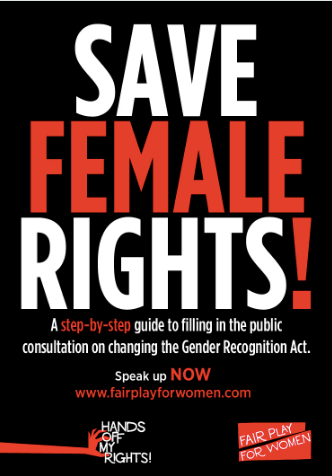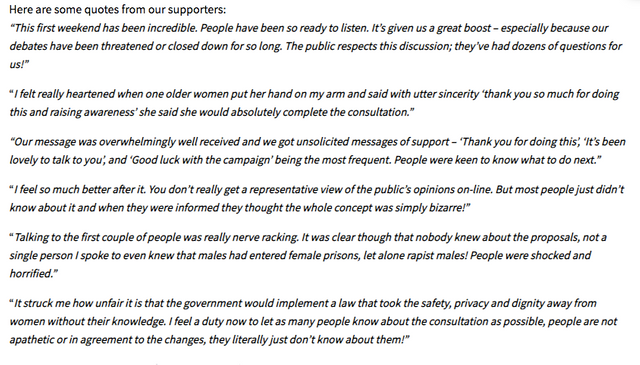
Concerns about this matter range from changing clothes in locker rooms to an erosion of the general boundaries outlined in biology. This organization also offers some questions that they provide answers to, which I will personally answer and address below:
The Question
Do you think there should be a requirement in the
future for a diagnosis of gender dysphoria?
(Yes. That requirement is a sense of persistent discomfort and/or disconnect with one's birth sex.)
What it Supposedly Means
Should doctors be involved before someone can change the sex on their birth certificate?
(I would say "no" for the sake of simplifying record-keeping, but this does not mean I agree with the overall premise of "female rights" or anything else this organization says.)
Do you think the privacy and disclosure of information provisions in section 22 of the Gender Recognition Act are adequate?
What it supposedly means
Should it remain a secret that someone has changed the sex on their birth certificate?
I don't think the sex on a birth certificate should be changed simply due to record-keeping and medical reasons, but, if someone decides to change it, they shouldn't be pressured into revealing it.
Do you think that the participation of trans people in sport, as governed by the Equality Act 2010, will be affected by changing the Gender Recognition Act?
If someone has transitioned to the point where a birth certificate change would not cause an issue, they should be able to compete with the gender they transitioned to. At which point in transition trans people should compete with the gender they are transitioning to should be determined by physical therapists, endocrinologists, and other experts in the field.
What it supposedly means
Will more male-born people be allowed to compete against women in sport?
(This is a long section in which I address the reasoning behind the answer, so brace yourselves.)
There is a reason why policing athletes' genders so stringently is not common practice anymore. Caster Semenya, a runner with hyperandrogenism, has been barred from competition and subjected to sex tests because fellow competitors and Pierre Weiss, president of the International Association of Athletic Federations, suspected she wasn't "100% female." Other female athletes with her condition are subjected to removal of internal testes and hormone-suppressing drugs as well as scrutiny from a variety of sources. Women with hyperandrogenism don't have any more advantage over other women than if they had longer legs, certain ancestry, or other biological factors at work.
Speaking of biological factors, a Spanish hurdler by the name of Maria José Martinez-Patino, had to undergo extensive sex testing. She received her certificate of femininity in Helsinki, but forgot her certificate and had to be re-tested, which included karyotyping, in Kobe. When the testing took place, she was told to fake an injury so no one would suspect anything. Doing as she was told, she discovered that she had XY 46 (genetically male) chromosomes. Certain conditions can cause a genetic male to develop as phenotypically female; that is the case with Patino. Her times were erased from her country's athletic records and she lost many personal relationships in the process. She was eventually allowed to run again, but at the cost of her privacy and dignity.
Karyotyping, hormone-testing, and anatomy inspections have historically led more to the humiliation of intersex female athletes than the prevention of unwanted men, which is why many sports organizations don't do it anymore. Not only that, a male athlete's gender being tested to this degree hasn't been made widely known, which suggests that narrow and largely inaccurate standards of biological femininity will only hurt women and women's athletics in the long run.
Do you think that the operation of the single-sex and separate-sex service exceptions in relation to gender reassignment in the Equality Act 2010 will be affected by changing the Gender Recognition Act?
Unless said organizations running separate or single-sex services have a problem with trans people, I don't think they will change.
What it supposedly means
Will providers of single-sex services be forced to close down or go mixed-sex if the Gender Recognition Act is changed?
No. Instead, unless they have a problem with trans and intersex people, they will treat trans and intersex people with sensitivity and respect while trying to remediate any issues that may arise.
Do you think that the operation of the occupational requirement exception in relation to gender reassignment in the Equality Act 2010 will be affected by changing the Gender Recognition Act?
It might in some situations, but largely no.
What it means
Will women find it increasingly difficult to be sure that intimate or sensitive services will be delivered by other females?
While I can understand the gynecology aspect, remember that trans women who want these positions will most likely go out of their way to present as feminine. That said, is a trans man more qualified than a trans woman to give female-specific services?
Do you think that the operation of the communal accommodation exception in relation to gender reassignment in the Equality Act 2010 will be affected by changing the Gender Recognition Act?
As long as the people in said accommodation aren't hostile towards or exclusionary of trans people and people change clothes and shower while exercising some level of discretion, nothing should change.
What it supposedly means
Will it become increasingly common for women and girls to find male-bodied people in the sleeping areas they sometimes share with other women?
While some trans women opt to not have SRS, they are more likely to go out of their way to hide their genitalia rather than show them to everyone. It is very rare for trans people to actively display parts of their body that cause dysphoria, so concerns about exhibitionism pale in comparison to concerns about hostility towards trans people.
Do you think that changes to the Gender Recognition Act will impact on areas of law and public services other than the Equality Act 2010?
I think the birth certificate change could make it harder to access transgender-specific services and cause confusion should someone need to divulge information about their childhood.
What it supposedly means
Could changes to the Gender Recognition Act mean more male-born prisoners get to live in women’s prisons?
It could. However, let's not forget that women can be violent criminals and sex offenders too.
Do you have any further comments about the Gender Recognition Act?
While I do see that the UK has good intentions for trans people, removing the requirement for gender dysphoria will prevent some groups from taking trans issues seriously and lead to future transphobia. As an alternative to help people in abuse situations or who don't have the money to get a diagnosis of gender dysphoria and/or start their transition, there should be nonprofits that provide these goods and services for free or for a reduced price with the rest of the costs covered by donations from voluntary donations and/or the government.
What it supposedly means
Are there important issues the Government has failed to ask you about in this consultation?
It did not address how a birth certificate change can potentially backfire on a person or how to otherwise prove their identity while maintaining some degree of privacy.
Now that I got that out of the way, I'm going to say that this organization looks like it could be a hoax or weird social experiment, but there's always the possibility that it could be real. For one, the site lacks any sort of humor, ruling out the possibility of satire. However, the logic (or lack thereof) behind the campaign might indicate that it is a hoax or social experiment. Not only that, I doubt that many people in the UK would seriously support an organization of this nature.
I searched Dr. Nicola Williams on Google and found a biographical website that doesn't produce any evidence that she isn't who she says she is. Searching Bo Novak's name, I found a Twitter page with similar results. Since I'm too lazy to extensively search every person's photo to find anyone planning to start this organization, I think there is a possibility that Fair Play for Women is a real organization and that it does have the potential to start (potentially violent) backlash against trans women.

Sources:
https://fairplayforwomen.com/campaignforfemalerights/ DOA 10-11-18
https://fairplayforwomen.com/wp-content/uploads/2018/08/FPFW-printable-guide-1.pdf DOA 10-11-18
https://www.nytimes.com/2016/08/20/sports/caster-semenya-800-meters.html
https://www.thelancet.com/pdfs/journals/lancet/PIIS0140-6736(05)67841-5.pdf
https://www.stonewall.org.uk/gender-recognition-act DOA 10-11-18
http://www.drnicolawilliams.com/ DOA 10-11-18
https://twitter.com/bo_novak?lang=en